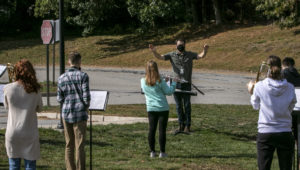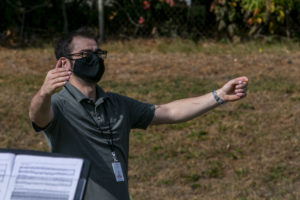
By Dakota Antelman, Contributing Writer
Northborough – Eric Vincent needs to buy buckets.
A music teacher at Algonquin High School, Vincent’s plans for the year have been upended by COVID-19, which has shrunk class sizes and created odd challenges for music educators.
When weather permits, Vincent and his colleagues can take their students outside where they can sing or remove masks to play wind instruments safely. But, when it rains, frosts or snows, the doors stay closed and the masks stay on.
Needing to get creative to fill time, Vincent and the Algonquin music department plan to launch a new unit this winter focused on the kind of “bucket drumming” popular as a street performing act in many cities.
“It’s a weird year,” Vincent said.
Virtual classes started in mid-September. But students didn’t return to Algonquin in person until Oct. 6.
As other academic disciplines wrestle with their own restrictions, music departments at Algonquin and across the region have had to make some of the most drastic changes to their instructional plans.
Large ensemble classes, which often seat more than 30 students, are nearly half the size this year.
Split hybrid cohorts are wreaking havoc for teachers trying to organize performance pieces around the students they have in front of them at any given time.
State regulations, meanwhile, have banned the playing of wind instruments indoors altogether.
“[The restrictions] require, right now, that we basically revamp everything that we do,” Vincent said. “I’m willing to do that, but it is different.”
Vincent said he and other music staff are working harder, now, than they ever have before. They’re putting in 12-hour workdays and preparing activities both for in-person learners, and students studying at home. They’re physically reshaping their classrooms all while revising and outright replacing huge swaths of long perfected curricula.
The day before in person classes started this month, Vincent was outside on the Algonquin campus with a 100-foot tape measure and a can of spray paint marking a grid for students to space themselves out during outdoor classes.
Elsewhere, a colleague teaching a chorus class was setting up shop under a large overhang that she hopes will allow her to teach and have students sing even when it rains.
“You could say it’s a pain,” Vincent said of these adaptations.
Through the frustration, Vincent stresses, however, there is a silver lining.
That aforementioned bucket drumming unit represents a chance for students to practice rhythm, Vincent said, in a way they have not previously.
Likewise, the loss of traditional major ensemble performance opportunities takes the pressure off students and teachers to learn elaborate large group compositions. Many students, now, are developing their improvisational skills.
“As terrible as all this is, it does present us with some unique opportunities to do some things that we may not have time for,” Vincent said.
Unaware of what the rest of the semester will bring amid the ever-evolving story of COVID-19, Eric Vincent remains dedicated to his students, pushing onward in circumstances few saw before March of this year.
“I’m just trying to give my students a quality musical education and something worthwhile,” he said.
Photos/courtesy Michelle Sheppard


















